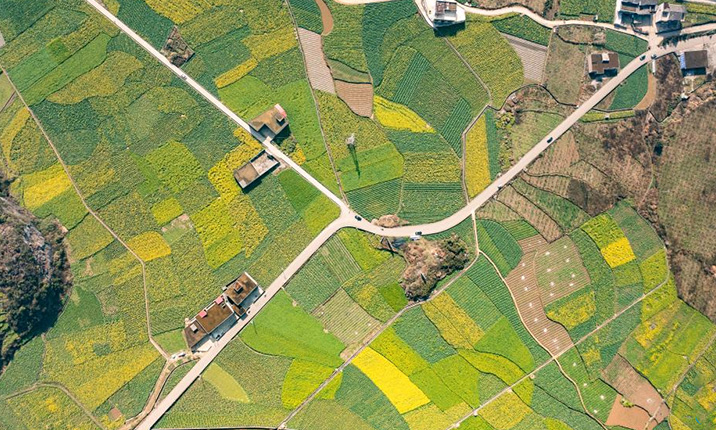Human rights achievements here never more evident: national lawmaker
URUMQI, March 8 (Xinhua) -- As a deputy to the National People's Congress, China's national legislature, Cui Jiuxiu is a participant and witness of human rights progress in Xinjiang Uygur Autonomous Region.
"We have launched a soil improvement project on the Gobi Desert, which meets the growth standards of white mulberry trees and other plant species," said Cui, deputy Party chief of Opal Township in Kashgar, southern Xinjiang. "If plantation and sericulture are launched here, many farmers will enjoy stable employment at their doorsteps."
Cui is now in Beijing attending the annual "two sessions" with thousands of national lawmakers and political advisors. She pays great attention to the topic of rural revitalization and focuses on local tourism development to create income for more locals.
Opal lies at the foot of the Pamir Plateau. Traditionally, the town has been involved in fruit cultivation, forestry and breeding, but a vast population with limited land, as well as dry environment have hampered its development.
Thanks to China's anti-poverty campaign, Opal has undergone profound changes. In 2021, five modern demonstration cattle and sheep breeding projects and 11 husbandry farms were set up in the town, with over 3,500 cattle and sheep added.
Currently, the town is popularizing scientific breeding technology for farmers and herdsmen. Patigul Amat is one of the beneficiaries of this initiative. With the adoption of new breeding methods, under technical guidance, no newborn calves owned by Patigul Amat got sick or died this year.
Like their peers, many young people from Opal used to aspire to move to cities and find a job with a steady income. Thanks to the efforts of Cui and her colleagues, young people from the town now have more career choices.
"In the past, a lot of farmers and herdsmen got into seasonal work. Many of them would come to me asking for stable jobs in the city," Cui said.
To improve the situation, the town provides training to farmers and herdsmen who are willing to work in cities, and helps them contact factories in industrial parks nearby, Cui added. "Many of them have stable jobs now."
Khelbinur Elet has been working in a garment factory in the town for over a year.
"I was a rural housewife with almost no source of income. After I came to the garment factory, the company provided me with social insurance and a monthly salary of about 2,000 yuan (about 316 U.S. dollars)," she said.
By the end of 2020, absolute poverty was eradicated in Xinjiang.
"People in the surrounding towns are busy improving their living standards just like us," Cui said. "The achievements of human rights progress in Xinjiang have never been more evident."
Photos
Related Stories
- U.S. human rights situation in 2021: Politicians play games in sham democracy, trample on people’s political rights
- Wondrous Xinjiang: Chinese opportunity through eyes of Belgian entrepreneur
- U.S. human rights situation in 2021: Abuse of force, sanctions violate human rights in other countries
- China improves human rights of people with disabilities through sports
- China refutes Blinken's groundless accusations concerning Xinjiang
Copyright © 2022 People's Daily Online. All Rights Reserved.










